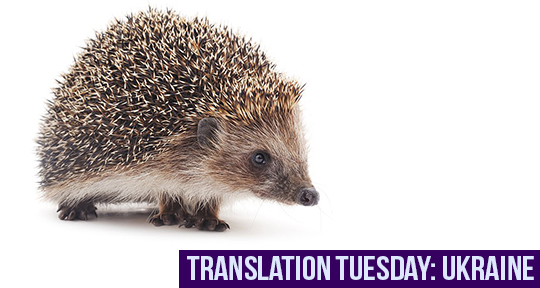For this week’s Translation Tuesday, Anastasia Afanas’eva constructs a world of shapes, shadows, and sensations that thematize dread and longing. The poem raises up images from the page in a maelstrom—a deluge of realizations that impress themselves on the reader like a flood. But the images’ actions are unreal; they are strung together in uncanny ways. In this poem, language acts absurdly, mirroring the unmistakable confusion of loss and of reckoning. The Hedgehog and its shadow are central, and show, in verse, how the most innocuous of things can become sutured with the weight of the universe.
Hedgehog
- Look what is happening on the earth
there is no distance, only a sieve
anything smaller than its holes
falls awayAnd that which is bigger lying empty
shines as if under a bush at night
a lost phone
no one to pick up - Oblivion grows and grows
and stands at full height
all of its glass height
simply as the word “yes.”It grows like a flood
impossible to conduct
like killing a hedgehog
the shadow of a hedgehog
follows its killer
all of his life - Who fell in your void
who is left to discern?I would have spoken
but only a leak is possible
on our boardHe who finds deep waters here
will drown
he does not believe what he is told
there is not a drop around only sandIn a city sink
he learns the fate of the river - The oblivion grows and grows
in large pink-skinned fruit
He cannot say where he is from, who he is
and why.I inflict my touch on his soft skin
and later, spit onto his forehead.The spit skids off
as if it were on ice.
These throes of passion
are for him, out of place.He is not flawed.
He does not mourn, or laugh.Look how he dries off,
and there is simply more shine.
He is smooth, white, and has so much gloss
that I suspect he is flat
and this brings him joy:
in a three dimensional world
he knows neither volume nor depth. - See what is happeningfor the one who was hopelessly drowning
the earth opened its black chasm.
About the dead, we cannot speak
for they are completed.And behind them goes the praise.
- Look how your hill has grown in
Where there was a creek, now there is moss
where there is a leak, the gap
reliably patches itself with grass.Your places release that
which made them yoursLook how life has outlived us all
The life, that carried you like a needle
inside your chest
soaring at impossible heights
losing weight in flightyour skin tightens
for this is how we are madeSee how everything has healed, and how
that which stood on all sides
like the walls of an ocean
murmurs in the white sink
and when you are irritated by the splash
you turn the faucet off - Look what is happening on this earth
how it has become smooth
the asphalt grown in, like grass
and the roads with a new black
highlight your whitenessAnd the air huge inside of you
pierces all of the openings
along your spine
the void is hammered in
with a glass nailIt is impossible to return
to something that is no longer there
to someone who is not there
you cannot reach them by phone
and perhaps there is no one to callDo not turn back on the roads
you have already passedYou walk on them
as if on a hedgehog
and another water is calling.
Translation from the Russian by Alla Vilnyanskaya
Anastasia Afanas’eva was born in 1982. She graduated from the Medical University of Kharkov with a degree in psychiatry. She worked in her field at the Kharkov Psychiatric Hospital. Her poetry, prose, and criticism of contemporary poets has been published in numerous journals and anthologies including Air, The New World, Vavilon, and others. She is a translator of poetry from English and Ukrainian. Most recently she successfully translated the work of Ilya Kaminsky, Musica Humana (New York: Ayloros, 2012). She received a Laureate Prize from the journal Word in 2005, The Russian Award in 2006, a prize from Literary X-Ray in 2007, and a Shortlist Prize in Debut in 2003. Her work has been translated into English, Italian, Dutch, and Belorussian.
Alla Vilnyanskaya was born in the Ukraine and raised in the U.S. She came to Philadelphia in 1989 with her parents. She holds an MA from Miami University and an MFA from Columbia University. Her work has been published in multiple online and print journals including Zaum, Poetry International, Saint Ann’s Review and Boog City. She is an alumni of The Home School and has won several teaching fellowships and other awards from Miami University and Columbia University. She is currently working on her first full length book of poetry.
*****
Read more translations on the Asymptote blog

